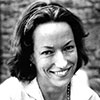October/November 2012 
The Prose Poem as a Modernist Genre

Margueritte Murphy
I begin with this quotation from Gertrude Stein not only because she produced some of the most startling and elusive prose poems of the 20th century in her collection, Tender Buttons, but because the impulse she describes behind their writing leads us to the heart of Modernist experimentation and to the value of the prose poem to that generation of writers.
Read more...
The Ekphrastic Poem: A Grounded Instance of Seeing

Jacqueline Kolosov
Ekphrasis (also spelled "ecphrasis"), the contemporary term for poems based on engagements with visual art, finds its origins in the Greek "ecphrasis" or description; the root of the word "phrazo" meaning "to explain or point out" or simply "to speak."
Read more...
An Interview with Edward Hirsch

Judith Harris
In Edward Hirsch’s collection of new and selected poems, The Living Fire, we may watch a trajectory of stunning poems covering thirty-five years of a poet’s vocation. Having mastered his own solitary apprenticeship to the great dead, literary precursors such as Dante, Rilke, Whitman, Lorca, and Keats, Hirsch found his own voice cleared of any influence, a voice Harold Bloom describes by saying “His voice is now uncannily his own; uncanny because we believe we have heard it before, yet the accents are unearthly and utterly fresh.” And Robert Penn Warren writes of Hirsch’s Wild Gratitude, “The best poems here are unsurpassed in our time.”
Read more...
Lunacy & Longing – Don Quixote & Adventures of Huckleberry Finn

Pablo Medina
When I was a boy, Don Quixote followed me everywhere. My aunt was fond of calling me Quixote whenever I set for myself a ridiculously impossible task, such as digging up the backyard in search of a treasure buried there, in my imagining, by Black Beard or Sandokan the Magnificent.
Read more...
The Book of Ruth: An Interview with Ruth Forman

Shonda Buchanan
Being a writer at that time to me was a way to connect with the world and the people I loved. I’m not very good at communicating verbally. I’m somebody who listens more than talks. I like to listen and absorb. But when I need to connect with people and I need to reach out, I write.
Read more...
More: An Interview with Laurie Foos

Jorge Armenteros
I’ll be perfectly honest and tell you that I have no adequate answer to why I write the way that I do. Writing fiction that departs from reality in some way is not intentional for me; it’s not a precept I impose upon the work. It’s simply what comes out of me.
Read more...
In the Beginning: Creating, Dynamic, Meaningful, & Compelling Openings

Richard Goodman
The beginning of your story, essay, or novel carries more weight than any other part of your work. This is simply because it is the beginning. The reason for its prominence is similar to seeing anything for the first time. Your senses are attuned. Your expectations are high. You are looking intently at what’s there.
Read more...
Berlin Alexanderplatz & the Music of Novels

Martha Cooley
Those of us who write literary novels do not fret just about penning our books but also about attracting and retaining readers, who, we all realize, are no longer encountered mainly in bookstores but rather via social media of all stripes.
Read more...
